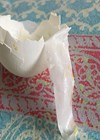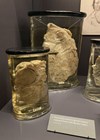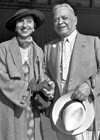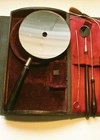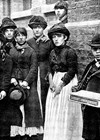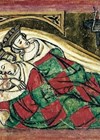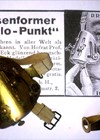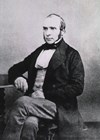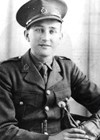History of ENT
Diaphanoscopy of the paranasal sinuses (Halloween in ENT Practice)
Since time immemorial, humans have tried to enhance the limited capabilities of their sense organs. It would be a clear advantage to be able to see through objects and discern what lies inside or behind them! This concept of transillumination...
The artificial eardrum: how an eggshell membrane fed a German ENT family
In the pre-antibiotic era, purulent otitis media often resulted in a permanent eardrum perforation with hearing loss. In addition to pig or fish bladders, eggshell membranes and cigarette paper were used as eardrum prostheses. I have vivid personal boyhood memories...
Down with the nose, down with it flat
In Shakespeare’s Timon of Athens, Timon urges prostitutes to spread syphilis throughout Athens. He implores the whores, Phrynia and Timandra, to: Consumptions* sow In hollow bones of man; strike their sharp shins,And mar men’s spurring*. Crack the lawyer’s voice**, That...
A legendary ‘parotid adenoma’: teaching aid or trophy? & The stapes: a classical heresy
A legendary ‘parotid adenoma’: teaching aid or trophy? A wander through the glass cases of the newly refurbished Hunterian Museum at the Royal College of Surgeons in London presents a particularly impressive sight to any ENT surgeon. The salivary adenoma...
A soprano’s demise: a cautionary tale for the thyroid surgeon
Prior to the mid-19th century, thyroid surgery was considered excessively dangerous. The emergence of anaesthetic, antisepsis and improved instrumentation, however, increased its feasibility and frequency in Europe. The unhurried, judiciously antiseptic and haemostatic approach, advocated by Kocher, was popularised and...
Reflected glory: the race to claim the laryngeal mirror
“None of today’s young doctors can start to imagine the feeling of professional helplessness and despair that prevailed before the invention of the laryngeal mirror. Thousands of people died, whom we were not able to help, or even bring relief...
Guillotines from Joseph‑Ignace Guillotin to Greenfield Sluder
Joseph‑Ignace Guillotin. The politician and physician Joseph-Ignace Guillotin (1738-1814) was so disgusted by brutal head and shoulder injuries sustained in ‘failed attempts’ by drunken axe-wielding executioners during the French Revolution that he and surgeon Antoine Louis (1723-1792) advocated not only...
The Matchgirls and Phossy Jaw: a striking tale of industrial action
Poor working conditions, long hours, low pay – and the prospect of a dangerous and disfiguring osteonecrosis of the jaw. These were the triggers for the 1400 ‘matchgirls’ of the Bryant and May factory to strike in July 1888, a...
The death of Attila the Hun, a 70s film and Japanese cartoons
The 6th century Gothic monk, Jordanes, tells us that Attila the Hun, the notorious and allegedly merciless barbarian (who was a prime mover in the fall of the Roman Empire), died of a nosebleed on his wedding night in 453...
The golden nose – reshaping the nose 100 years ago
Wolf Lűbbers (with the golden nose). Who with a crooked nose would not embrace the chance to go to bed in the evening wearing a surgical device and wake up the following morning with a straight one? And all this...
The ear, nose and throat anaesthesia practice of Dr John Snow (1813-58)
News of the first successful public demonstration of general anaesthesia in Boston, Massachusetts in October 1846 reached Britain in mid-December of that year. James Robinson, a London dentist, gave the first anaesthetic in the United Kingdom when, on 19 December,...
Did you ever meet Draffin on your travels?
Draffin’s rods or bipods are a well-known ENT instrument. Before their invention in 1951, the attendant anaesthetist or nurse was obliged to support the mouthgag during tonsillectomy. Their originator, David Alexander Draffin (born in 1917 in Ballybey, Co Monaghan), was...



